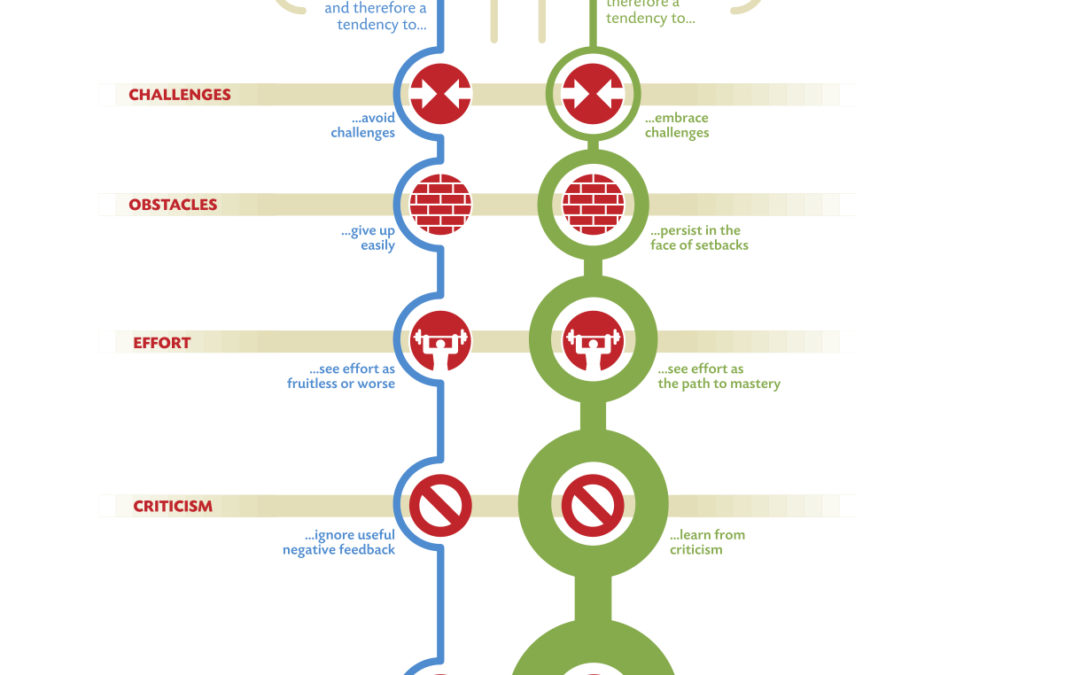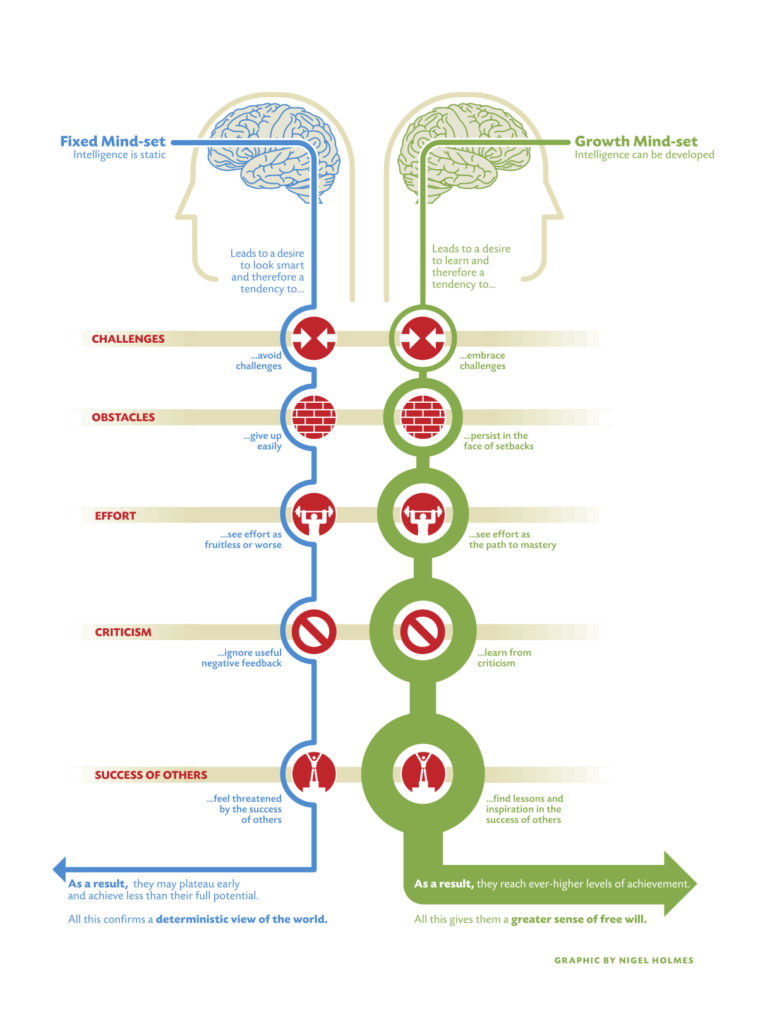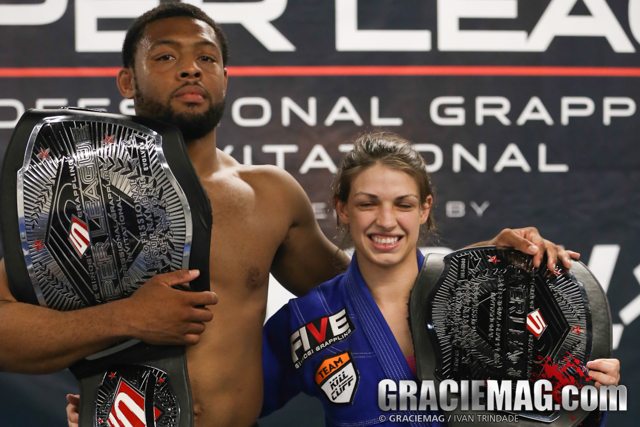Carol Dweck is Professor of Psychology and a best-selling author. She is most famous for her concept of a “growth mindset”.
For twenty years, my research has shown that the view you adopt for yourself profoundly affects the way you lead your life. It can determine whether you become the person you want to be and whether you accomplish the things you value. How does this happen? How can a simple belief have the power to transform your psychology and, as a result, your life?
Believing that your qualities are carved in stone — the fixed mindset — creates an urgency to prove yourself over and over. If you have only a certain amount of intelligence, a certain personality, and a certain moral character — well, then you’d better prove that you have a healthy dose of them. It simply wouldn’t do to look or feel deficient in these most basic characteristics.
There’s another mindset in which these traits are not simply a hand you’re dealt and have to live with, always trying to convince yourself and others that you have a royal flush when you’re secretly worried it’s a pair of tens. In this mindset, the hand you’re dealt is just the starting point for development. This growth mindset is based on the belief that your basic qualities are things you can cultivate through your efforts. Although people may differ in every which way — in their initial talents and aptitudes, interests, or temperaments — everyone can change and grow through application and experience.
This 3:50 minute video Clearly Explains Growth vs Fixed Mindsets
How a Fixed Mindset will Destroy Your Chances of Becoming Good
Students often can feel that they “suck” or are not improving. These feelings can be triggered from a competition or even just a typical practice session. A student with a Fixed Mindset will look to these external events as proof that they are “good” or “talented”. If the event doesn’t go the way they wanted, they feel that they are no longer good or talented.
Because the feeling of self-worth is built upon winning or losing, these individuals will look for opportunities that justify their self worth rather than challenges which will force them to grow. This Fixed Mindset can cripple their ability to get a productive practice: They’ll be tempted to avoid the tougher training partners. They won’t come in and train if they’re anything less than 100%. They might feel more pressure to cheat in order to always win. They will avoid the tougher competitions and stick to tournaments that they’ve been winning. You might as well start the funeral dirge for their future success.
The proper mindset is to view practice as a method of getting better. Winning doesn’t equal Success. Effort to Improve equals Success. In other words, the focus should be on the process of improving rather than the result of that improvement.
This seems very obvious but any coach will tell you that it is very common for martial arts students to have Fixed Mindsets.
How a Fixed Mindset will Destroy Your Child’s Chances of Becoming Good
Over the past decade, I’ve noticed that many parents don’t give their child a chance to grow and develop his or her ability. These parents often cycle their children through different sports and activities to find the one that the child is “good at” now rather than sticking with an activity long enough for the child’s ability to actually blossom.
I can tell you from experience, that Tim Spriggs, who recently took 3rd at the Black Belt Worlds and is one of the Worlds best Brazilian Jiu-Jitsu Black Belts right now, was NOT an exceptional athlete or grappler when he started at Crazy 88. The main reasons why we recognized him was that he sincerely tried despite being 16 years old, had good family support, and worked hard.

As a teenager, Tim Spriggs was more interested in Call of Duty and Spongebob Square Pants ties than Jiu-Jitsu.
This example is especially poignant because Timmy is currently referred to as “super athletic” and “genetically gifted” by the Jiu-Jitsu community.
What would have happened if after his first 3 months of training, his parents thought, “Oh, I don’t think Jiu-Jitsu is right for Timmy. He’s just not picking it up as fast as some of the other kids. Maybe he should just try XYZ?”
Every single Jiu-Jitsu World Champion that comes from Crazy 88 was not a member of the “Wow – this guy is amazing on his first day” group. In fact, I would classify all of them as Above Average athletes with Extremely High Effort Level. Most of the guys who were phenoms from day one, ended up being above average or quitting – never becoming the super star that their first few practices seemed to indicate.
The point is that parents and adult students should emphasize improvement and growth rather than constant evaluations of their own self-worth based on winning or losing. In other words, take on a a Growth Mindset.
Remember that human beings can be high-responsive or low-responsive to training. A high-responsive athlete will have more gains per practice session but this doesn’t mean that the low-responsive athlete can not reach the same performance level – it just means that he might have to put in more work. As that work gets put in, athletes will often find that they jump levels. This is why you sometimes see an unremarkable athlete transform into a phenomenal athlete the following year. Maybe, this athlete was under-sized for his age and during that extra 12 months, he had a growth spurt which gave him the extra physicality he needed. Maybe the athlete was lacking in a particular skillset and within that time frame, he built it up and now has a complete skill set.
You have to give the athletes time to develop and the mindset necessary to put in the effort to develop.
Hope that makes sense.



